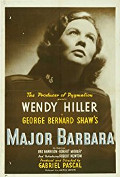
Directed by
Gabriel Pascal / David Lean / Harold French
135 minutes
Rated PG
Reviewed by
Bernard Hemingway

Major Barbara
Wendy Hiller stars as the title character, an idealistic young woman who has joined the Salvation Army in order to do good works in London’s East End slums. performing her duties she meets Adolphus Cusins (Rex Harrison) who falls in love with her and joins the Army in order to be with her. Eventually the contradiction between her ideals and the realities of her life as daughter of rich weapons manufacturer Andrew Undershaft (Robert Morley) becomes too much, she quits the Army and Adolphus follows her.
I have not read George Bernard Shaw’s play on which this film is based but as Shaw who was notoriously choosy about such things wrote the screenplay (adding 18 minutes to the running time) I assume it is faithful to the original. Even so, it is a difficult film to follow, its rather stiffly-drawn moral agenda being propped up by unproductive sub-plot and some rather florid acting.
Hiller, who had made such an impact with her previous film, a version of Shaw’s Pygmalion (1938) carries over a good deal of her posh Eliza Doolittle as the well-bred Salvation Army major in a rather mannered, albeit appealing performance whilst Harrison (who would play Professor Higgins in My Fair Lady, 1964) is in fine form as her beau. The film itself however is a rather lumpy affair as it switches back and forth between the East End mission (where a n eye-catching Deborah Kerr makes her screen debut as Barbara’s aide) and her swanky London home presided over by her formidably upper-class mother (Marie Lohr). Robert Newton, in characteristic histrioni form, appears in the former for some protracted business designed to demonstrate (I think) Barbara’s Salvationist skills and Walter Hudd in the latter as Barbara’s otiose brother, designed (I presume) to typify upper-class twists. Adolphus swans about Barbara’s and her father’s home as if to the manorr born before everyone heads over to Andrew’s huge munitions factory where they become convinced that works of charity are less important to helping humanity than enlightened capitalism. Morley plays the business tycoon like a canny sybarite whereas (I gather) in Shaw’s original he is a moneyed oaf.
Despite its shortcomings Major Barbara is still an enjoyable film thanks particularly to Hiller and Harrison and an impressive one for a war-time production. It also boasts a host of behind-the-scenes talent including cinematography by Ronald Neame and although direction was originally credited to the Hungarian producer Gabriel Pascal who owned the sole rights to film Shaw's work, it was apparently directed by David Lean (who also edited) with Harold French.
Want something different?





